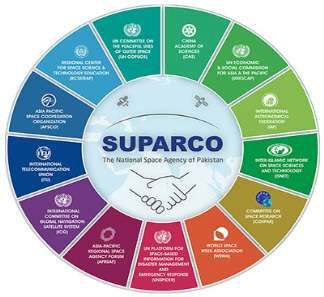
Muhammad Hassan
Pakistan's Upper Atmosphere Research Commission, SUPARCO, has a long history of triumphs and challenges. Founded in 1961, the Commission is the impetus behind Pakistan's satellite technology and space program. Over time, SUPARCO evolved into a significant force in the development of the country's utilization of space technology for the advancement of society. With a modest yet significant space program, Pakistan positions itself as an aspiring spacefaring nation owing to its extensive history of space study and exploration. The country's perpetual commitment to using space technology for peaceful reasons has elevated it to the forefront of socioeconomic progress.
From the beginning, SUPARCO's primary goals were to conduct space research and advance the peaceful utilization of space. By performing research and launching suborbital rockets, it started this endeavor. In the 1970s, SUPARCO advanced towards satellite technology for surveillance, imagery, telecommunications, atmospheric testing, and other scientific research. It also offered technical education and employment for its ground-based satellite stations nationwide. With support from the US National Aeronautics and Space Administration (NASA) and various other Western aerospace organizations, the Commission was able to develop and test the Rehbar Sounding rockets. To broaden its influence, SUPARCO engaged in collaboration with numerous other foreign space agencies and organizations. This represented a significant turning point for the country's space capabilities and opened many opportunities for scientific and socioeconomic development in Pakistan.
SUPARCO has a remarkable history and boasts several noteworthy achievements. It began its space journey by launching ground breaking satellites like Badr-1(1985), Pakistan's first domestically manufactured satellite. Subsequently, it launched Badr-B in 2001, Paksat-1R in 2011, and the revolutionary PRSS-1 & PAK TES-1A in 2018. Creating the "Pakistan Space Weather Centre" (PSWC), one of SUPARCO's most recent initiatives, is evidence of the Commission's dedication to cutting-edge technology. PSWC offers invaluable data on solar radiations, geomagnetic weather events, ionosphere conditions, and maritime satellite imagery, thus underscoring SUPARCO's role as a pioneering force in Pakistan's scientific and technological landscape.
In conjunction with its notable accomplishments, SUPARCO has fostered a vital element of international cooperation as a critical component of its space development strategy. The Commission has consistently participated in joint projects with a spectrum of international organizations and networks, including prestigious entities like "The Inter-Islamic Network on Space Sciences and Technology (ISNET)" and "The Asia-Pacific Space Cooperation Organization (APSCO)." By emphasizing capacity building, SUPARCO aims to promote an atmosphere of international cooperation, expanding the limits of space research and technology globally. This strategic commitment to global partnerships underscores SUPARCO's role as a dynamic player on the international stage and accentuates its pivotal contribution to the broader space community.
As we approach a new era, it is crucial to recognize the enormous potential that SUPARCO has at its disposal. SUPARCO's prospects show us that the Commission is prepared to play a more prominent role as a catalyst for Pakistan's socioeconomic development as it develops and works with local, national, and international collaborators and propels us into a fascinating future. One of the significant prospects of SUPARCO is its Space Program Vision- 2047 commenced in July 2014. The Program aims to launch five Geostationary orbit (GEO) satellites and six Low Earth orbit (LEO) satellites by 2047. The Program intends to replace SUPARCO's existing satellites in orbit, develop new communication and remote sensing satellites and conduct research in space science and technology.
As a part of the Program, a significant step forward for Pakistan was the development of remote-sensing satellites. Pakistan now has a priceless resource in the form of remote sensing satellites, which provide the country with a valuable resource harnessing an array of initiatives and projects from socioeconomic development and environmental preservation to disaster mitigation and fostering International Collaboration.

The two satellites that Pakistan currently has in orbit, the "Technology Evaluation Satellite (PAKTES-1A)" that was built domestically and the "Pakistan Remote Sensing System (PRSS-1)" that was purchased from China, can effectively resolve the frequent internal water disputes between the provinces regarding the share of water for each province. It can also help with agriculture by guiding farmers in making good decisions and boosting agricultural output through resource planning. As Pakistan is highly vulnerable to climate change, it can also help disaster management by lessening the consequences of natural disasters.
SUPARCO also has a significant international collaboration component in its space development agenda with continuous cooperation with numerous international and domestic organizations. Recently, the Chairman of SUPARCO visited the Deep Space Exploration Laboratory (DSEL) in southeast China to identify specific roles Pakistan could play in the China-led International Lunar Research Centre (ILRS) and sign a cooperation agreement.
Moreover, SUPARCO representatives have also discussed ways to increase cooperation with Pakistan's Higher Education Department (HED). The two organizations are looking into opportunities for collaborative projects in research and development. Discussions between SUPARCO and HED representatives focused on strengthening strategic collaboration and improving educational technology to create a cutting-edge higher education management information system.
Furthermore, SUPARCO manages a network of cutting-edge research centres that is a foundation for its ambitious space program objectives. Institute of Space and Technology (IST), SUPARCO Institute of Technical Training (SITT), Institute of Space and Planetary Astrophysics (ISPA) These are some of those institutes which facilitate Pakistan to expand its space science and technology capabilities and to advance more extensive scientific research and development initiatives.
The numerous contributions of SUPARCO to agricultural and food security, urban planning, resource management, forestry, mangroves, disaster management, support for the 2023 census, water management, and other crucial sectors show its strong commitment to utilizing space technology and making a significant contribution to several sectors of the country.
However, amidst these promising prospects, SUPARCO nevertheless faces challenges. The primary hurdle it faces is inadequate funding. With a budget of just $26 million for 2023, SUPARCO operates with limited financial resources compared to significant space agencies such as the Indian Space Research Organization (ISRO), which boasts a yearly budget exceeding 1.5 billion USD. This financial disparity underscores the pressing need for increased investment to realize Pakistan's space potential. Furthermore, the country's adverse effects of political changes and instability can disrupt long-term planning and continuity, hindering the agency's ability to carry out sustained, visionary projects. Addressing these challenges will be crucial for SUPARCO to unlock the full spectrum of opportunities space technology offers for Pakistan's development.
In conclusion, SUPARCO’s unwavering commitment to the peaceful application of space technology serves as a testament to the transformational power of space science in steering Pakistan towards a more promising and sustainable future. Despite the persistent challenges brought on by political and economic limitations, SUPARCO has made significant strides in pursuing space science and technology. The Commission's accomplishments are indisputable, from launching space satellites to fostering international collaboration, from disaster mitigation to bolstering agriculture and water resources optimization to providing effective solutions for various socioeconomic issues. They demonstrate its perseverance in the face of hardship, underline the enormous potential for future growth, and kindle optimism for an even more prosperous future.